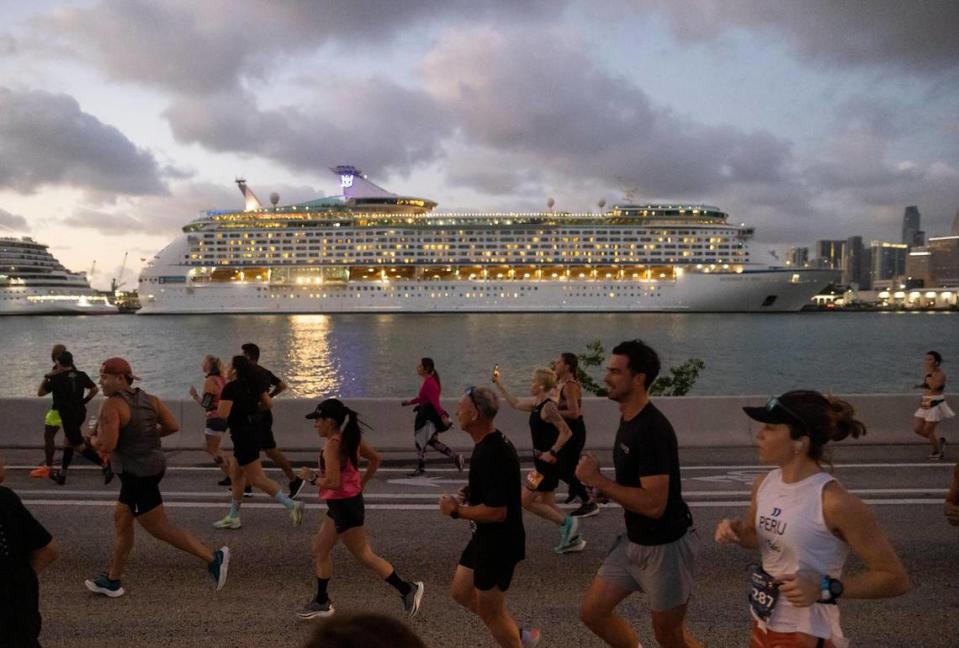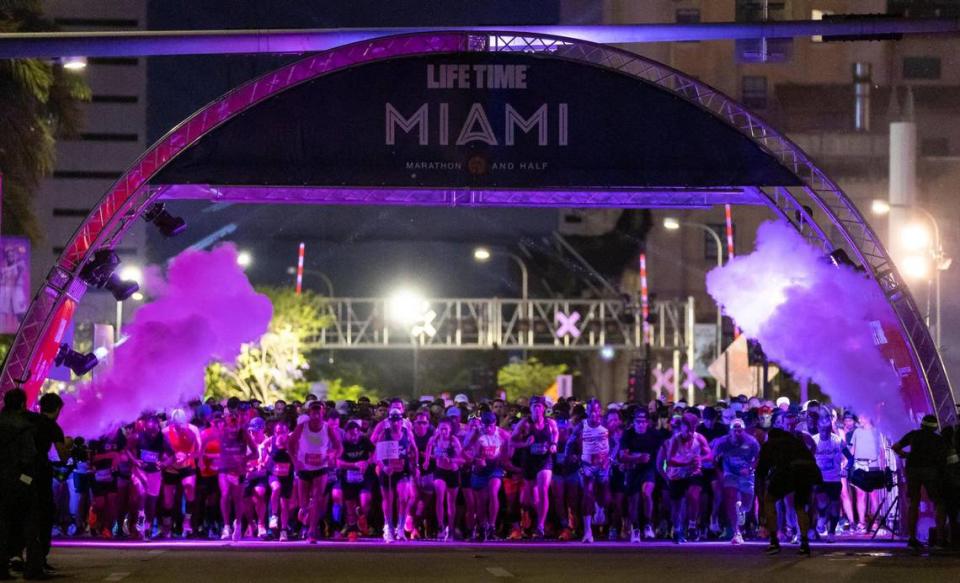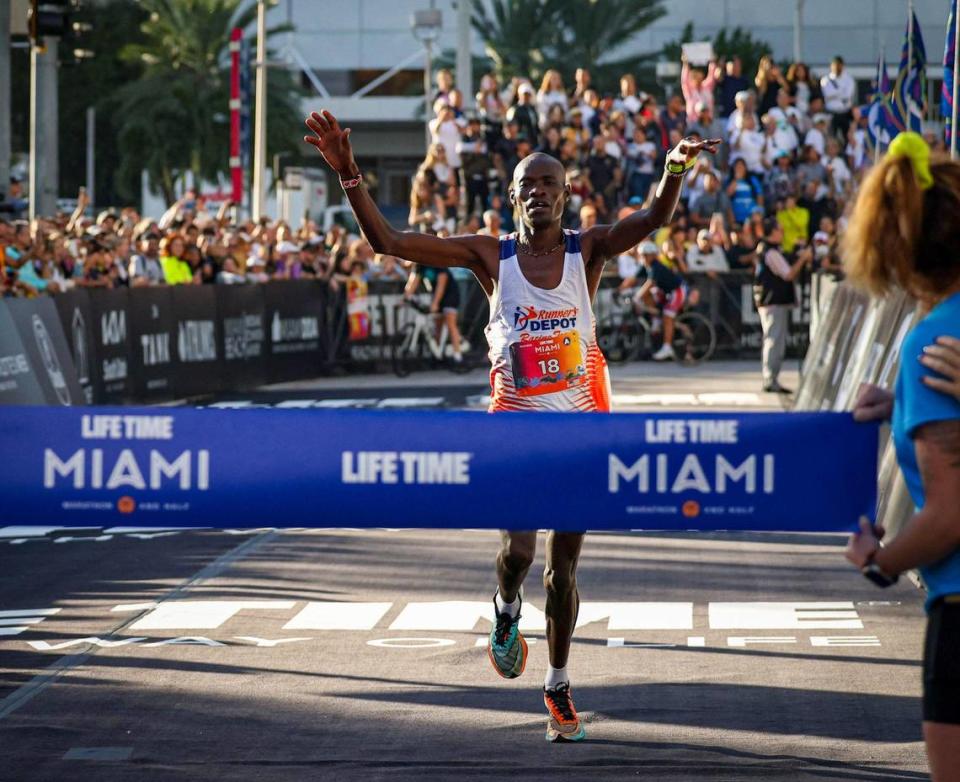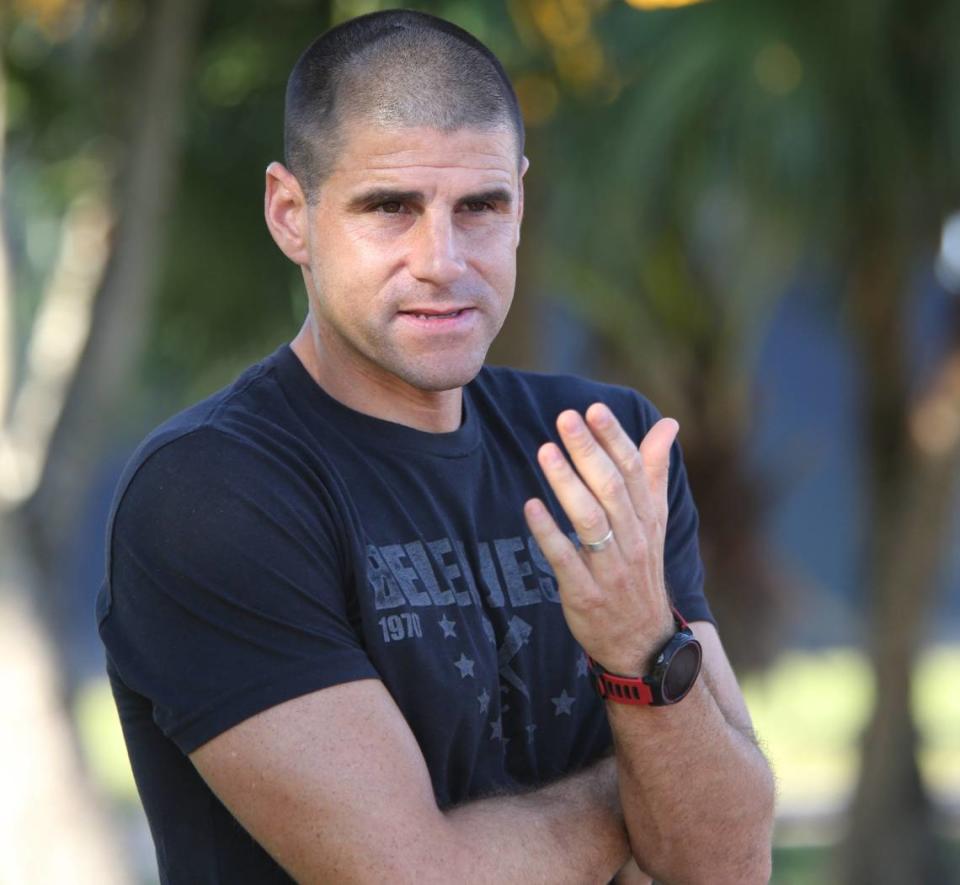Temperatures to rise for the Life Time Miami Marathon, a hot ticket in more ways than one
Life Time Miami Marathon race director and co-founder Frankie Ruiz sometimes refers to the weather conditions during the 26.2-mile journey through what many regard as paradise, “the great equalizer.’’
Ruiz, the Belen Jesuit cross country coach named the state and national (Nike) cross-country coach of the year, has known all about the uncertainty of what nature could bring to Miami for the combined marathon/half marathon field each Sunday since 2003.
As this Sunday’s 22nd running approaches its 6 a.m. start, the prospect of temperatures rising into the 80s has made him concerned that participants make sure to “plan accordingly.’’
About 30-percent of the registered capacity field of 18,000 competes in the longer, 26.2-mile full marathon, with about 9,500 from Florida and several thousand representing 49 states and 75 countries. As of late Thursday afternoon, Sunday’s forecast called for a 74-degree start with 90-percent humidity and not much breeze.
As marathoners take off into the Biscayne Boulevard darkness, ascend the MacArthur Causeway past lit-up cruise ships and continue along Ocean Drive as the sun rises on South Beach, then continue over the majestic Venetian Causeway, into Brickell and Coconut Grove and back to the finish adjacent to Bayfront Park, the thermometer will rise to 81 by 10 a.m. and 85 by noon.
Frustratingly, the next day’s forecast calls for 57 degrees at 6 a.m., 24 hours too late.
“I do worry about the weather,’’ Ruiz said. “Some people don’t understand it, so it is a big deal if you don’t make it one of your factors — if you don’t respect it and don’t plan accordingly. Adjust your pace by starting off easier than you would ever think of, because it hasn’t been this warm in awhile.
“If you’re not from here you, you don’t quite understand humidity. Hydrate before and during and do what’s best for you — whether that’s wearing a hat or sunglasses or putting on extra chafing cream because you’re going to sweat more, or paying more attention to your electrolyte replenishment.
“Unless you’re coming from the Bahamas or in the Caribbean, you’re probably going to be running in warmer weather than you trained in.”
International field
The elite field in this year’s event has about 42 entrants, fairly evenly split between the marathon and half marathon. The world-class international field includes runners from Kenya, Mexico, Venezuela, Canada, Brazil, Switzerland and Panama.
Several would-be Miami runners bypassed the event to compete in the U.S. Olympic Marathon Team Trials on Feb. 3 in Orlando.
Stephen Clevenger, 37, an elite marathoner who lives most of the year in Decatur, Illinois, and moved in December with his wife and two young children to live part-time in the Brickell area, chose to run Miami.
“Decatur is a small town and Miami is a big city,’’ said Clevenger, a financial advisor whose best result in his previous six marathons is 2 hours 20 minutes 41 seconds at the 2019 California International Marathon. “I felt if I could do well in my quote-unquote hometown marathon, that would be cool. I’ve been training a lot and the course is nice. It’s going to be hot, so I’m going to be conservative at the start and see what happens with everybody else.’’
Clevenger will be pushed by Miami defending champion George Onyancha, 30, of Kenya, who earned the overall title, and $4,500 first-place prize, in 2 hours 18 minutes 25 seconds. Onyancha raved about the palm trees and “very friendly” Miamians in his first trip to the United States.
Damaris Areba, 28, another Kenyan, won the 2023 Miami Marathon (and $4,500) in 2:33:49, the event’s second-fastest time in history. She will be back Sunday as well.
“I like the people in Miami,’’ Areba said last year. “They cheered for me the whole course.’’
This year’s prize money is almost identical to last year’s. Besides the $4,500 that goes to the male and female marathon winners, second place runners earn $2,000 and third-place, $1,000. The half marathon winners earn $1,500, $800 and $450.
Aid stations
The race is prepared with 23 aid stations, not including the comprehensive medical tent at the finish with doctors and medical personnel supplied by Baptist Health. Several medical professionals will line the course, as well as fire-rescue ambulances.
About 500 police officers are situated along the course, all paid, off-duty officers.
Cheer zones
For those who want to cheer on their friends or loved ones, Ruiz urges fans to arrive early and sit on the bleachers near the finish or stand and cheer along the route. Designated cheer zones include Mile 5 1/2 at Washington Avenue and 17th Street in Miami Beach (6 to 8:30 a.m.), Mile 11 at the Omni Metrorail Station at Northeast 15th Street and Biscayne Boulevard in Miami (6:30 to 9:30 a.m.), Mile 20 1/2 at CocoWalk at 2982 Grand Avenue in Coconut Grove, and Mile 24 at Brickell Medical Plaza at 2660 Brickell Avenue.
Race officials will allow ample time for the slowest participants to finish. Each runner should have at least seven hours to reach the finish from when they cross the starting line. It takes about 45 minutes, Ruiz said, for the slowest runners to actually reach the starting line. And, as usual, Ruiz and staff members will be there to greet them with medals.
“We try to stick around for the last finisher,’’ he said. “We’re excited that everyone is back safely and we can reopen the roads. I want to make sure the last person feels the same type of love and attention that the first person gets.’’
If you go
▪ What: Life Time Miami Marathon and Half Marathon
▪ When/Where: 6 a.m. start Sunday, Jan. 28, on Biscayne Boulevard outside the Kaseya Center in downtown Miami; Finish is adjacent to Bayfront Park.
▪ Who: Combined field of 18,000.
▪ Expo: 12 to 7 p.m. Friday and 10 a.m. to 6 p.m. Saturday at the Miami Beach Convention Center, 1901 Convention Center Dr., Miami Beach.
▪ Registration: closed. Race sold out.



